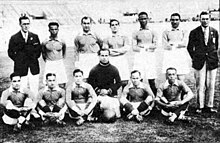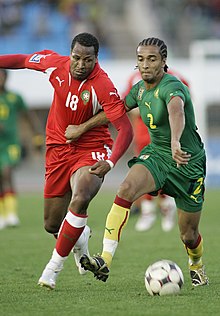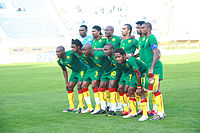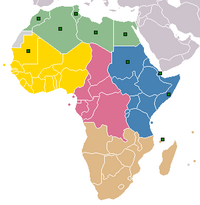Portal:Football in Africa
Introduction
Football is the most popular sport in Africa. Indeed, football is probably the most popular sport in every African country, although rugby and cricket are also very popular in South Africa. (Full article...)
This section may be unbalanced toward certain viewpoints. (October 2022) |

Selected article -
The team has qualified for the FIFA World Cup eight times, more than any other African team, and four times in a row between 1990 and 2002. However, the team has only made it out of the group stage once. They were the first African team to reach the quarter-final of the World Cup in 1990, losing to England in extra time. They have also won five Africa Cup of Nations.
Cameroon is the first and, as of 2022, only African country to defeat Brazil in tournament play, beating them in the 2003 Confederations Cup and 2022 FIFA World Cup by identical 1-0 scores.
Selected biography -
Kalusha Bwalya is a former Zambian footballer, coach and current president of the Football Association of Zambia (FAZ). He is Zambia's most capped player, second all-time top goalscorer behind Godfrey Chitalu, and is regarded as the greatest Zambian footballer of all time. He was named African Footballer of the Year in 1988 by the magazine France Football and was nominated for the 1996 FIFA World Player of the Year where he was voted the 12th-best player in the world, the first to be nominated after playing the entire year for a non-European club.
Bwalya's older brother Benjamin also played professional football, while his younger brother Joel also played for the Zambia national football team. His cousin is former Cardiff City and Welsh national team striker Robert Earnshaw.
Selected image -

Subcategories
Related portals
More sports portals
WikiProjects
Related task forces and sub-projects
African football task force
WikiProject Africa • WikiProject Football
WikiProject Football task forces and sub-projects
 | |
| Wikipedia ads | file info – #250 |
Topics
Open tasks

- Expand stubs: Competitions in Africa • Organizations
- Expand club articles of teams from Africa.
- Expand biographies of Africans involved in football.
- Create: Requested articles • Most wanted football articles • Requested general football articles
- Add: Infoboxes • Images (General requests, Requested images of people)
- Review: articles currently under review
- Assess: Assessment requests • Assess an article
- Revert vandalism on this portal and on African football articles
- Assist in maintaining this portal and keeping its selected content up to date.
- WikiNews: Create and submit news stories about African football for Wikipedia's sister project WikiNews.
Associated Wikimedia
The following Wikimedia Foundation sister projects provide more on this subject:
-
Commons
Free media repository -
Wikibooks
Free textbooks and manuals -
Wikidata
Free knowledge base -
Wikinews
Free-content news -
Wikiquote
Collection of quotations -
Wikisource
Free-content library -
Wikiversity
Free learning tools -
Wiktionary
Dictionary and thesaurus
More portals
Sources

- ^ "The History Of Soccer In Africa". NPR.org. 2010-06-09. Retrieved 2016-03-31.
- ^ a b c Alegi, Peter (2010). African Soccerscapes. Ohio University Press. pp. 1–2. ISBN 9780896802780.
- ^ Frimpong, Enoch Darfah. "Ghana news: A world of superstition, frustration and disillusionment - Graphic Online". Retrieved 23 September 2017.
- ^ Lacey, Marc (8 August 2002). "Kangemi Journal; For Spellbinding Soccer, the Juju Man's on the Ball". The New York Times. NY Times. Retrieved 2016-03-31.
- ^ "World Cup Witchcraft: Africa Teams Turn to Magic for Aid". National Geographic. Archived from the original on July 10, 2006. Retrieved 2016-03-31.
- ^ Andy Mitten (September 2010). The Rough Guide to Cult Football. Rough Guides UK. ISBN 9781405387965. Retrieved 2016-04-02.
- ^ "African Nations Cup overshadowed by hocus pocus | Football". The Guardian. Retrieved 2016-04-09.
- ^ Kuper, Simon (2006). Soccer Against the Enemy: How the World's Most Popular Sport Starts and Stops Wars, Fuels Revolutions, and Keeps Dictators in Power. Nation Books. p. 123. ISBN 978-1-56025-878-0.

























